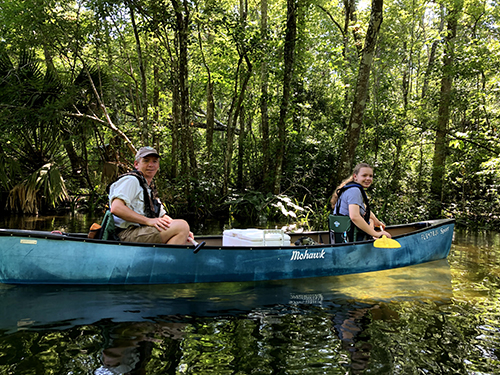 Have you ever wondered who the commissioners are and what they do? We caught up with Commissioner Shane Wellendorf and asked him five questions about his experience as a volunteer commissioner and about his love of the land.
Have you ever wondered who the commissioners are and what they do? We caught up with Commissioner Shane Wellendorf and asked him five questions about his experience as a volunteer commissioner and about his love of the land.
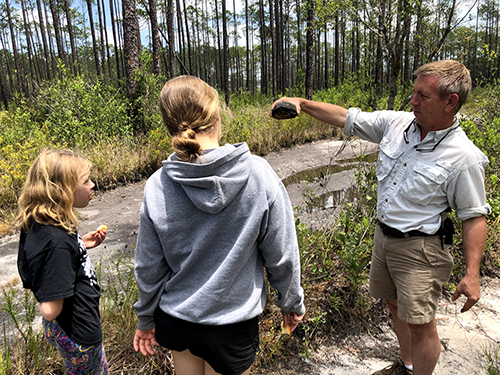
Q: What drives your passion for land conservation?
A: My passion for land conservation was unexpected. A little like a slow burn fuse, over time, my interest took off. It's exciting to me how land conservation is a blend of project development, real-estate deal-making, natural resources and landowner extension services. And when a project is complete, the landowner wins, the public wins, and our natural resources win. It's easy to get passionate about that! Land conservation work has me optimistic about the future. When working on a forested tract, it's exciting to envision what the forest might look like in 100 years or even 500 years. We recently started a conservation easement project to protect a large, forested basin swamp dominated by 100-year-old bald cypress. You stand next to these trees and realize they are just youngsters. So, with a conservation easement, a little luck, and a few hundreds of years, this will be a magnificent stand of trees. I hope future landowners, visitors, and biologists will admire the grandeur of these old, massive cypress and appreciate the conservation that allowed them to remain part of the swamp. The permanence of our conservation efforts today will influence the future.
Q: What drew you to serve as a volunteer commissioner?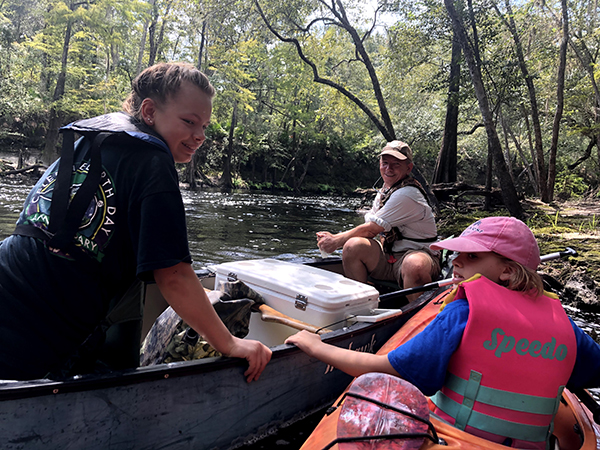 A: I think service to the community is a prevailing belief of most land conservation professionals. It's just part of the culture. You spend time with land trust folks, and their commitment to the greater good for land conservation permeates everything. It's contagious. I'll never forget my first Land Trust Alliance Rally in Milwaukee. I was blown away by the dedication of so many to help everyone there become better. I established relationships at that first Rally that continue even today. Many Rallies later, I had an opportunity to serve on the Standards Advisory Team, which was assembled to assist in revising the Land Trust Standards and Practices. It was a lot of work but a worthwhile experience that opened my eyes to the power of collective wisdom. Looking back, I gained so much professionally and personally from that experience. A few years later, when first approached about joining the Land Trust Accreditation Commission, it just seemed like the right thing to do for me and the community. It's a time commitment but well worth it. Serving as a commissioner has provided an amazing opportunity to interact with the other commissioners and staff and has strengthened my belief in the power of collective wisdom and support for community.
A: I think service to the community is a prevailing belief of most land conservation professionals. It's just part of the culture. You spend time with land trust folks, and their commitment to the greater good for land conservation permeates everything. It's contagious. I'll never forget my first Land Trust Alliance Rally in Milwaukee. I was blown away by the dedication of so many to help everyone there become better. I established relationships at that first Rally that continue even today. Many Rallies later, I had an opportunity to serve on the Standards Advisory Team, which was assembled to assist in revising the Land Trust Standards and Practices. It was a lot of work but a worthwhile experience that opened my eyes to the power of collective wisdom. Looking back, I gained so much professionally and personally from that experience. A few years later, when first approached about joining the Land Trust Accreditation Commission, it just seemed like the right thing to do for me and the community. It's a time commitment but well worth it. Serving as a commissioner has provided an amazing opportunity to interact with the other commissioners and staff and has strengthened my belief in the power of collective wisdom and support for community.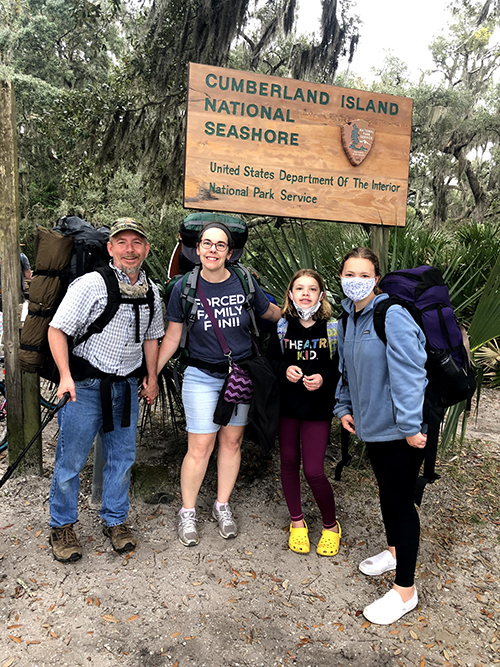 Q: What has been the most surprising thing about serving on the Commission?
Q: What has been the most surprising thing about serving on the Commission?
A: Maybe not unexpected, but I'm so impressed with the accredited land trusts that I am privileged to review. The breath of their projects, their creativity, and their hard work is so impressive to me. As a commissioner, I'm obligated to ensure a land trust is following the Standards and meeting the indicator elements. Still, I hope land trusts know that deep down, I'm rooting for you, as I think all of the commissioners are. As part of an accredited land trust, I understand the effort and work it takes to be awarded the accreditation seal, but I always knew it was worth it. Being a commissioner has only increased my awareness of the importance of accreditation. Our land conservation community is stronger for it, and I am proud to be a part of it all.
Q: What is your favorite childhood memory of being outdoors?
A: Without question, my favorite place growing up was the Loess Hills Wildlife Management Area in western Iowa. The Loess Hills are a unique geologic formation of wind-blown soil with steep ridges and deep draws. The dramatic topography protected areas of native prairie and forests of mature bur oaks. At the time, there were very few large tracts of public lands in the state, but you could go and just wander at this place. Every autumn, my family would pick a bright, clear fall day and hike the hills, and then buy apples from the local orchards on the way home. I returned to the Loess Hills often, hunting pheasants, quail, and deer. But the most memorable was the turkey hunting. The sound of turkeys gobbling from the ridgetop still resonates with me. I haven't rambled in the Loess Hills for a long time, but it's reassuring to know that there is a dedicated effort to conserve and expand the natural areas in this incredible part of Iowa.
Q: What is your favorite way to spend time in nature?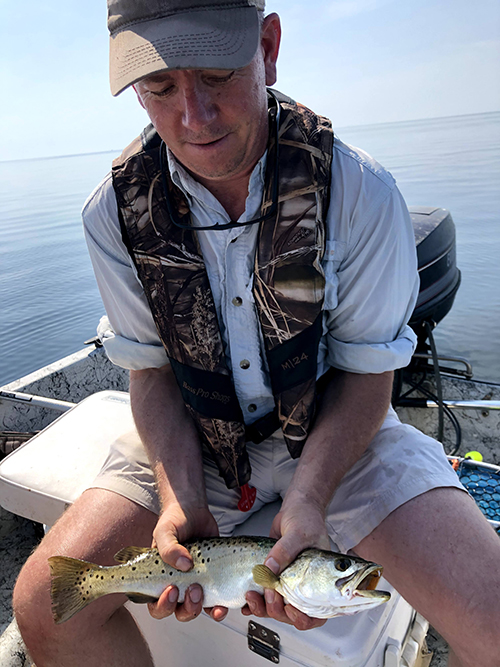
A: North Florida and South Georgia are blessed with an abundance of natural areas and public land to explore with the family. Even after more than 20 years here, there are still places I want to see. In the warmer months, we spend a lot of time on the water, mainly canoeing our nearby rivers or fishing the shallow-water grass flats in the Gulf of Mexico. There's so much diversity to it all. You can float down a crystal-clear spring-fed river, like the Wacissa River, one weekend and the next be going down the limestone shoals of the Aucilla River with its water stained dark as coffee. You never know what might be around the bend, a big gator, a prothonotary warbler singing, or jumping mullet. During winter, I enjoy spending time quail hunting with our bird dogs. There's nothing better than a cool winter afternoon with friends and dogs afoot, the sun shining through the piney woods, and the excitement of a covey rise. When it all works, it is truly exhilarating.
Thanks to Shane for sharing his story with us!
About the Commission
The Land Trust Accreditation Commission's main office is located in Saratoga, New York. There are five full-time staff who work out of this office and two staff members who work remotely (though right now, we're all working remotely!). The staff are responsible for the day-to-day operations of the Commission and are responsible for processing and reading applications as well as promoting accreditation. Click here for more detailed information about the role of the Commission.
The Commission is governed by a diverse board of 18 volunteer commissioners involved in land conservation and nonprofit management experts from around the country. Commissioners volunteer their expertise to verify that a land trust is implementing specific accreditation indicator elements from Land Trusts Standards and Practices. Click here to learn more about the commissioners, including a commissioner job description.
Commissioners and the Commission review staff work together to review accreditation applications. Several times a year, Commission meetings are held to present on that round of applications. Before COVID-19 these meetings would take place around the country but are presently being held via video conference.




